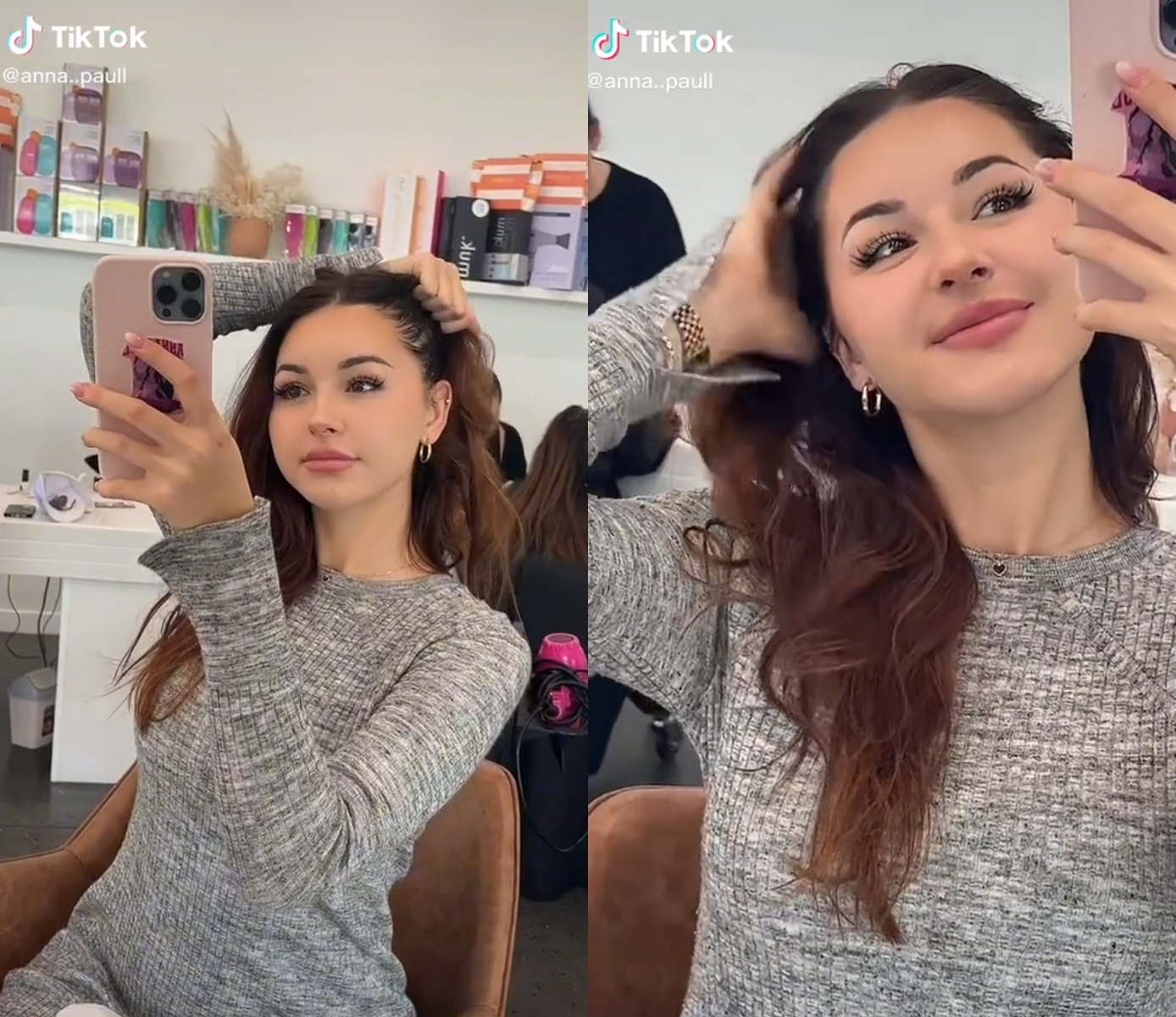Anna Paul OnlyFans Leak: Unraveling the Controversial Content Phenomenon
The "Anna Paul OnlyFans Leak" refers to the unauthorized disclosure of explicit content originally posted by Anna Paul, a popular social media influencer, on the subscription-based platform OnlyFans. The leak gained significant notoriety in 2021 when private photos and videos of Paul were widely shared online without her consent, causing a media frenzy and raising important questions about digital privacy and consent in the digital age.
The incident sparked debates around the relevance of OnlyFans as a platform for content creators to monetize their work, the benefits and risks associated with online platforms, and the historical context of unauthorized content leaks in the digital realm. This article delves into these aspects, examining the significance of the leak, its implications for content creators and consumers, and the evolving landscape of digital privacy and consent.
As the article progresses, it explores the legal and ethical ramifications of unauthorized content leaks, the role of social media platforms in addressing such incidents, and the ongoing efforts to protect the rights of content creators and consumers in the digital age.
anna paul only fans leak
The "Anna Paul OnlyFans Leak" serves as a poignant case study, highlighting crucial aspects of digital privacy, consent, and the evolving landscape of online content sharing. Three key points emerge from this incident, each carrying significant implications for content creators, consumers, and policymakers alike:
- Unauthorized Disclosure: The unauthorized release of private content without consent raises fundamental questions about digital privacy and the protection of personal information in the online realm.
- Content Monetization: The OnlyFans platform epitomizes the growing trend of content creators monetizing their work through subscription-based models, redefining the relationship between creators and consumers.
- Digital Consent: The leak underscores the complexities of consent in the digital age, where the lines between public and private spaces are blurred, and the notion of consent takes on new dimensions.
These points intertwine to create a multifaceted issue that demands thoughtful exploration. The leak serves as an example of the challenges faced by content creators in protecting their work and maintaining control over their digital presence. It also highlights the need for platforms like OnlyFans to implement robust measures to safeguard user privacy and prevent unauthorized content sharing. Furthermore, the incident prompts a broader discussion on the legal and ethical implications of digital consent, particularly in the context of online platforms where content is easily shared and disseminated.
Unauthorized Disclosure
Within the context of the "Anna Paul OnlyFans Leak," the unauthorized disclosure of private content without consent has brought to light several fundamental issues related to digital privacy and the protection of personal information in the online realm. These issues extend beyond the specific case and raise concerns about the broader implications for content creators, consumers, and the overall digital landscape.
- Consent and Control: Unauthorized disclosure violates the individual's right to control and consent to the sharing of their private information and content. It raises questions about the adequacy of existing consent mechanisms and the need for stronger safeguards to protect user autonomy.
- Blurred Boundaries: The digital realm often blurs the lines between public and private spaces, making it challenging to define and enforce boundaries around personal information. This ambiguity can lead to situations where individuals' private content is shared without their knowledge or consent.
- Platform Responsibility: Online platforms have a significant role in preventing unauthorized disclosure and protecting user privacy. The "Anna Paul OnlyFans Leak" highlights the need for platforms to implement robust security measures, enforce strict policies against unauthorized sharing, and provide users with tools to control their content.
- Legal and Ethical Implications: Unauthorized disclosure often raises complex legal and ethical questions, particularly when it involves the sharing of explicit or sensitive content. This can lead to debates about freedom of expression, privacy rights, and the potential consequences for individuals whose private content is leaked.
These points underscore the urgent need for a comprehensive approach to addressing unauthorized disclosure in the digital age. This includes legal reforms, platform accountability, and educational efforts to raise awareness about digital privacy and consent. The "Anna Paul OnlyFans Leak" serves as a stark reminder of the challenges and complexities surrounding the protection of personal information in the online realm.
Content Monetization
The "Anna Paul OnlyFans Leak" incident is intricately linked to the broader trend of content monetization on platforms like OnlyFans. This platform has emerged as a prominent example of how content creators are increasingly using subscription-based models to generate revenue from their work, directly connecting with their audience and redefining the traditional creator-consumer relationship.
Cause and Effect: The rise of content monetization platforms like OnlyFans has both enabled and been influenced by the "Anna Paul OnlyFans Leak." The platform's subscription-based model allowed Paul to monetize her content effectively, but the unauthorized disclosure of her private content also highlighted the potential risks associated with such platforms. This incident has prompted discussions on the need for stronger safeguards to protect creators' privacy and control over their content.
Components: Content monetization is a fundamental element of the "Anna Paul OnlyFans Leak" incident. The unauthorized sharing of Paul's private content occurred within the context of OnlyFans' subscription-based platform, where users pay to access exclusive content from creators. The incident raised questions about the platform's responsibility in preventing unauthorized disclosure and protecting user privacy.
Examples: The "Anna Paul OnlyFans Leak" is a prominent example of the potential risks associated with content monetization platforms. Other instances of unauthorized content leaks from similar platforms have also occurred, highlighting the need for improved security measures and user protections. Conversely, the success of OnlyFans and other content monetization platforms demonstrates the growing demand for alternative revenue streams for content creators in the digital age.
Applications: Understanding the relationship between content monetization and the "Anna Paul OnlyFans Leak" has practical implications for various stakeholders. Content creators need to be aware of the potential risks and take necessary precautions to protect their privacy and control over their content. Platforms like OnlyFans should invest in robust security measures and implement clear policies to prevent unauthorized disclosure. Additionally, policymakers may consider regulations to address the legal and ethical implications of unauthorized content leaks.
In conclusion, the "Anna Paul OnlyFans Leak" incident serves as a case study that highlights the complex interplay between content monetization, creator rights, and digital privacy. It underscores the need for a balanced approach that protects the rights of content creators while also ensuring the privacy and security of users. Moving forward, stakeholders must work together to develop effective strategies to address these challenges and ensure a sustainable and ethical content monetization ecosystem.
Digital Consent
The "Anna Paul OnlyFans Leak" incident has brought to light the intricate relationship between digital consent, privacy, and the blurred boundaries between public and private spaces in the digital age. This leak, involving the unauthorized sharing of explicit content originally posted on the subscription-based platform OnlyFans, has sparked discussions and debates surrounding the complexities of consent in the digital realm.
Cause and Effect:The leak has highlighted the potential consequences of sharing private content online without explicit consent. It has prompted discussions on the need for robust consent mechanisms and the importance of respecting individuals' privacy rights in the digital age. Conversely, the incident has also raised concerns about the ease with which private content can be shared without consent, particularly on platforms where users have limited control over their content once it is shared.
Components:Digital consent plays a crucial role in the "Anna Paul OnlyFans Leak" incident. The unauthorized sharing of Paul's content without her consent underscores the importance of obtaining explicit consent before sharing or using someone else's private information or content. This incident serves as a reminder that consent is not a one-time act but an ongoing process that requires continuous attention and respect for individuals' privacy.
Examples:The "Anna Paul OnlyFans Leak" is a prominent example of the challenges associated with digital consent in the digital age. Other cases of unauthorized content sharing on social media platforms and online forums have also raised concerns about the lack of control individuals have over their digital footprint. These incidents highlight the need for stronger legal frameworks and platform policies to protect individuals' privacy and prevent the unauthorized sharing of private content.
Applications:Understanding the complexities of digital consent in the context of the "Anna Paul OnlyFans Leak" has practical implications for various stakeholders. Content creators need to be aware of the potential risks associated with sharing private content online and take necessary precautions to protect their privacy. Platforms like OnlyFans should implement robust security measures and clear policies to prevent unauthorized content sharing and protect users' privacy. Additionally, policymakers can play a role in developing regulations that address the legal and ethical implications of unauthorized content leaks.
Summary:The "Anna Paul OnlyFans Leak" incident has served as a catalyst for discussions on digital consent, privacy, and the evolving nature of consent in the digital age. It has highlighted the need for stronger legal frameworks, platform policies, and individual awareness to protect privacy and prevent unauthorized content sharing. Moving forward, stakeholders must work together to address the challenges posed by the complexities of digital consent and ensure a safer and more respectful online environment.
Frequently Asked Questions
This section addresses common questions and misconceptions surrounding the "Anna Paul OnlyFans Leak" incident. These FAQs aim to provide clarity and further insights into various aspects of the leak and its implications.
Question 1: What is the "Anna Paul OnlyFans Leak"?
Answer: The "Anna Paul OnlyFans Leak" refers to the unauthorized disclosure of explicit content originally posted by Anna Paul, a popular social media influencer, on the subscription-based platform OnlyFans. The leak gained notoriety in 2021 when private photos and videos of Paul were widely shared online without her consent, raising concerns about digital privacy and consent.
Question 2: Why is the leak significant?
Answer: The leak sparked discussions about the relevance of OnlyFans as a platform for content creators to monetize their work, the benefits and risks associated with online platforms, and the historical context of unauthorized content leaks in the digital realm. It also highlighted the importance of digital privacy and consent in the age of social media and online content sharing.
Question 3: What are the legal implications of the leak?
Answer: The leak raises complex legal questions, including copyright infringement, invasion of privacy, and unauthorized distribution of private content. The unauthorized sharing of Paul's content without her consent may constitute a violation of her privacy rights and could potentially lead to legal action against those responsible for the leak.
Question 4: How does the leak impact content creators on OnlyFans?
Answer: The leak has brought attention to the vulnerabilities faced by content creators on OnlyFans and other similar platforms. It highlights the need for stronger platform policies and security measures to protect creators' privacy and prevent unauthorized content sharing. Additionally, the incident has sparked discussions about the importance of informed consent and the ethical considerations surrounding the sharing of explicit content online.
Question 5: What are the platform's responsibilities in preventing such leaks?
Answer: Platforms like OnlyFans have a responsibility to implement robust security measures and enforce strict policies against unauthorized content sharing. They should provide creators with tools and resources to protect their content and maintain control over who has access to it. Additionally, platforms must have clear mechanisms for users to report and address instances of unauthorized content sharing.
Question 6: What are the broader societal implications of the leak?
Answer: The leak has prompted discussions about the evolving nature of consent and privacy in the digital age. It raises questions about the boundaries between public and private spaces online and the need for individuals to be more mindful about the content they share and the platforms they use. The incident also highlights the importance of digital literacy and education in empowering individuals to protect their privacy and make informed choices online.
These FAQs provide a deeper understanding of the "Anna Paul OnlyFans Leak" and its implications for content creators, consumers, and the broader digital landscape. As the conversation surrounding this incident continues, it is crucial to address the underlying issues of digital privacy, consent, and platform accountability to create a safer and more ethical online environment.
Moving forward, discussions will delve into the ongoing efforts to address unauthorized content leaks, the role of technology in safeguarding digital privacy, and the evolving relationship between content creators and online platforms.
Tips for Protecting Your Digital Privacy and Content
In an increasingly digital world, safeguarding your privacy and protecting your online content are crucial. This section presents actionable tips to help you maintain control over your personal information and prevent unauthorized disclosure of your content.
1. Strong Passwords: Create strong, unique passwords for all your online accounts and change them regularly. Use a combination of upper and lowercase letters, numbers, and symbols to make them harder to crack.2. Two-Factor Authentication: Enable two-factor authentication (2FA) whenever available. This adds an extra layer of security by requiring an additional verification code when logging in to your accounts.3. Be Mindful of Oversharing: Before sharing personal information or content online, consider who has access to it and how it could be used against you. Refrain from oversharing sensitive information on social media or public platforms.4. Privacy Settings: Review and adjust the privacy settings on your social media accounts and online platforms. Restrict access to your personal information and content to only those you trust.5. Secure Your Devices: Use security software and keep your operating systems and apps up to date to protect your devices from malware and vulnerabilities. Regularly scan your devices for threats.6. Avoid Public Wi-Fi: Be cautious when using public Wi-Fi networks as they can be less secure. Avoid accessing sensitive information or making online payments while connected to public Wi-Fi.7. Be Wary of Phishing Scams: Phishing emails and websites are designed to trick you into revealing personal information. Be skeptical of unsolicited emails or messages asking for your personal or financial information.8. Educate Yourself: Stay informed about the latest digital privacy and security trends. Regularly update your knowledge about online threats and best practices to protect yourself.Key Takeaways:By following these tips, you can significantly reduce the risk of unauthorized access to your personal information and protect your online content from being shared without your consent. Maintaining good digital hygiene habits is essential in safeguarding your privacy and security in the digital age.
Transition to Conclusion:Adopting these practices not only helps protect your digital privacy but also contributes to creating a safer and more secure online environment for everyone. In the concluding section, we will explore the role of technology, legislation, and individual responsibility in shaping the future of digital privacy and content protection.
Conclusion
The "Anna Paul OnlyFans Leak" incident serves as a stark reminder of the vulnerabilities faced by content creators in the digital age and the urgent need for stronger protections for digital privacy and consent. This article has delved into the complexities of the leak, exploring its implications for content creators, consumers, and the broader digital landscape.
Key points that emerged from this exploration include the importance of robust platform policies and security measures to prevent unauthorized content sharing, the need for content creators to be aware of the risks and take precautions to protect their privacy, and the ongoing challenges in defining and enforcing digital consent in the age of social media. These points are interconnected, highlighting the shared responsibility of platforms, creators, and users in creating a safer and more ethical online environment.
As we move forward, it is crucial for all stakeholders to work together to address the systemic issues that allowed the "Anna Paul OnlyFans Leak" to occur. This includes investing in technological solutions to combat unauthorized content sharing, advocating for stronger legal frameworks that protect digital privacy, and promoting digital literacy and education to empower individuals to make informed choices online.
The "Anna Paul OnlyFans Leak" incident is not just an isolated case; it reflects a broader societal need to re-evaluate our approach to digital privacy and consent in the ever-evolving online world.
Nikita dragun only fans leaked
Milan mirabella leaked only fans
Olivia dunne only fans leak

8.2 Million Followers and a Chaotic Meet and Greet — Everything You

Anna Paul shocks TikTok fans after revealing her real job

OnlyFans star Anna Paul buys ‘whiteboard’ MercedesBenz so fans can

Anna Paul’s STAX popup cancelled over safety concerns as hundreds

OnlyFans yıldızı Anna Paul, TikTok'ta 'kalıcı olarak yasaklandı'
ncG1vNJzZmidnqbCqr7Eq2WapaNoe6W1xqKrmqSfmLKiutKpmJydo2OwsLmOmqWnmV2lrra4jKilpbFdm66vv4ylnJqjXp3Brrg%3D